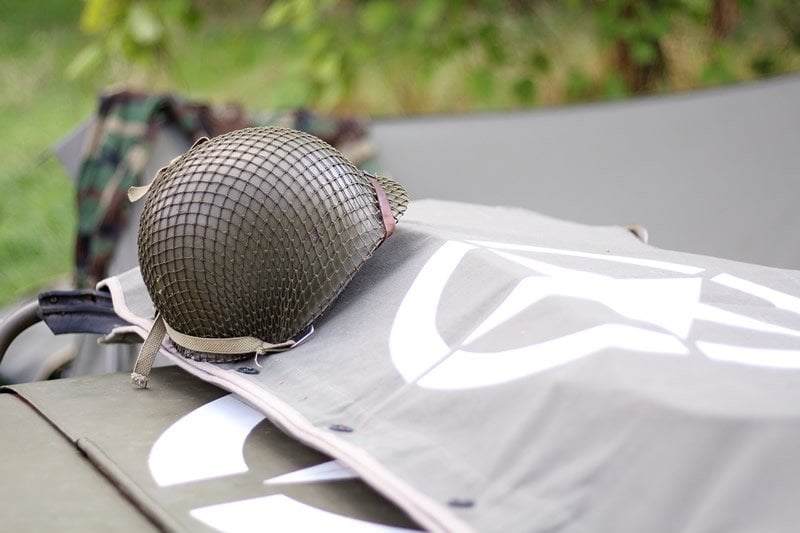Summary: Soldiers who suffer traumatic brain injury are significantly more likely than those who suffer other serious injuries to be diagnosed with mental health disorders including PTSD, schizophrenia, and anxiety.
Source: University of Massachusetts Amherst
U.S. combat soldiers who suffered a moderate or severe traumatic brain injury (TBI) are more likely than soldiers with other serious injuries to experience a range of mental health disorders, according to a new retrospective study by University of Massachusetts Amherst health services researchers.
“A central takeaway is that severe TBI is associated with a greater risk of mental health conditions – not just PTSD,” says lead investigator David Chin, assistant professor of health policy and management in the School of Public Health and Health Sciences. “Our findings suggest that patients who are critically injured in combat and sustain severe TBI have particularly high rates of mental health disorders.”
The research, published in the journal Military Medicine, is the largest and broadest look at severe combat injury in the military and associated mental health outcomes. Chin and co-author John Zeber, UMass Amherst associate professor and program head of health policy and management, examined the cases of 4,980 military members – most from the Army or Marines – who were severely injured during combat in Iraq and Afghanistan between 2002 and 2011. Nearly a third of them suffered moderate or severe TBI.
Mining data from the U.S. Department of Defense, Chin found that 71% of all the severely injured soldiers were diagnosed in follow-up care with at least one of five mental health conditions: post-traumatic stress disorder (PTSD), anxiety and mood disorders, adjustment reactions, schizophrenia and other psychotic disorders, and cognitive disorders. Previous research reported that a much lower 42% of seriously injured combat soldiers went on to be diagnosed with mental health disorders. And Chin notes that his study defined mental health diagnoses more narrowly.
In Chin’s research, diagnoses for every mental health condition were higher among the cases of TBI than other severe injuries.
“Most of the research on TBI has looked at mild to moderate brain injury,” Chin says, with estimated incidence of associated PTSD to be as high as 23% – significantly lower than the 46% incidence Chin’s research noted in cases of more severe TBI.
In addition, Chin found that the risk for post-traumatic stress disorder (PTSD) is higher – not lower, as previous investigators have assumed – among combat soldiers with more severe TBI.
“There was a common belief that having a severe TBI resulted in an amnestic effect on PTSD – the injuries were so severe that the patients have no memory of the event and that put them at lower risk of having mental health outcomes. This data showed to the contrary,” Chin says.

In addition to including personnel from all four military service branches, the study followed the soldiers’ care for a median period of more than four years. Earlier studies about TBI in the military typically involved one service branch and only followed the soldiers for one year after the injury.
Even with the longer timeframe, Chin says the study “definitely underestimates” the prevalence of mental health conditions among severely injured soldiers. Among the study’s limitations: researchers had access only to Department of Defense-related records, so researchers were unable to track cases after the soldiers were discharged; and the military culture engenders an underreporting of mental health symptoms.
While Chin emphasizes that more research is necessary, the study illustrates the importance of monitoring the mental health status of seriously injured soldiers, especially those with severe TBI, for years after their injury, and ensuring that clinical and support services are available to veterans and their families.
Source:
University of Massachusetts Amherst
Media Contacts:
Patty Shillington – University of Massachusetts Amherst
Image Source:
The image is in the public domain.
Original Research: Open access
“Mental Health Outcomes Among Military Service Members After Severe Injury in Combat and TBI”. David L Chin, PhD, John E Zeber, PhD.
Military Medicine doi:10.1093/milmed/usz440.
Abstract
Mental Health Outcomes Among Military Service Members After Severe Injury in Combat and TBI
Introduction: Studies examining the mental health outcomes of military personnel deployed into combat zones have focused on the risk of developing post-traumatic stress disorder conferred by mild or moderate traumatic brain injury (TBI). However, other mental health outcomes among veterans who sustained critical combat injuries have not been described. Materials and Method: We examined the associations of moderate and severe TBI and combat injury with the risk for anxiety and mood disorders, adjustment reactions, schizophrenia and other psychotic disorders, cognitive disorders, and post-traumatic stress disorder. We conducted a retrospective cohort study of U.S. military service members critically injured in combat during military operations in Iraq and Afghanistan from February 1, 2002, to February 1, 2011. Health care encounters from (1) the Department of Defense (DoD) Trauma Registry (TR), (2) acute and ambulatory care in military facilities, and (3) civilian facilities are reimbursed by Tricare. Service members who sustained severe combat injury require critical care. We estimated the risk of mental health outcomes using risk-adjusted logit models for demographic and clinical factors. We explored the relationship between TBI and the total number of mental health diagnoses. Results: Of the 4,980 subjects who met inclusion criteria, most injuries occurred among members of the Army (72%) or Marines (25%), with mean (SD) age of 25.5(6.1) years. The prevalence of moderate or severe TBI was 31.6% with explosion as the most common mechanism of injury (78%). We found 71% of the cohort was diagnosed with at least one poor mental health condition, and the adjusted risk conferred by TBI ranged from a modest increase for anxiety disorder (odds ratio, 1.27; 95% confidence interval [CI], 1.11–1.45) to a large increase for cognitive disorder (odds ratio, 3.24; 95% CI, 2.78–3.77). We found TBI was associated with an increased number of mental health diagnoses (incidence rate ratio, 1.52; 95% CI, 1.42–1.63). Conclusions: Combat-associated TBI may have a broad effect on several mental health conditions among critically injured combat casualties. Early recognition and treatment for trauma-associated mental health are crucial to improving outcomes among service personnel as they transition to post-deployment care in the DoD, Department of Veterans Affairs, or community health systems.






